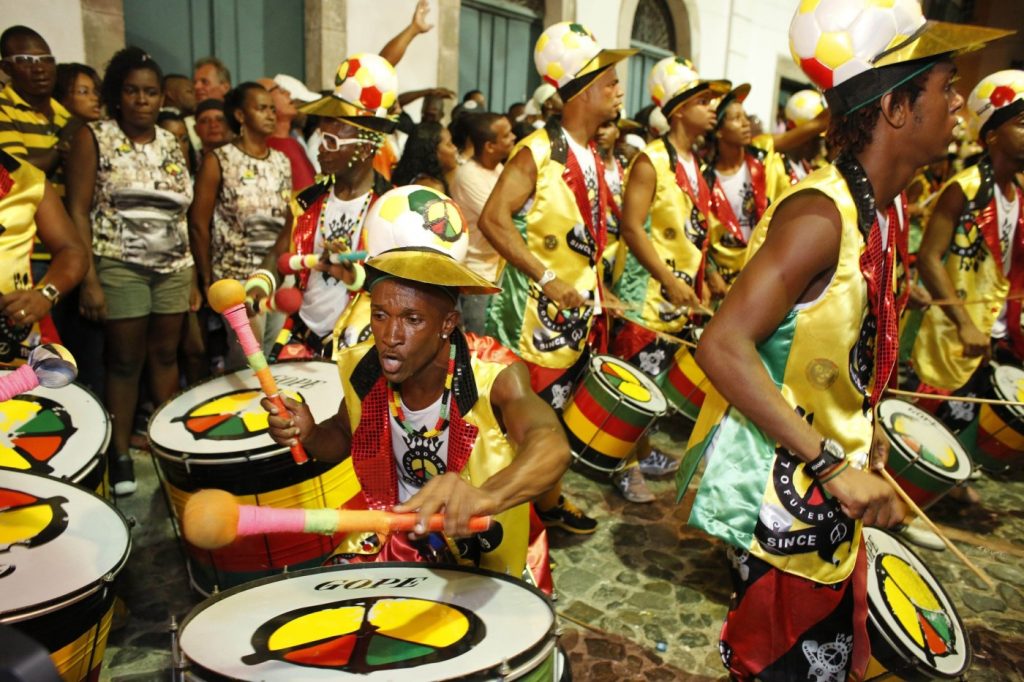Rhonda Holder’s first visit to Brazil came from a desire to see Rio de Janeiro’s world-famous Copacabana Beach, Christ the Redeemer statue and colorful Selarón steps. The 67-year-old retired Air Force lieutenant colonel and nurse from Hampton, Virginia, had stumbled upon a Facebook ad from Travel Divas, a company offering luxury group tours for Black women. They seemed to be having a ball, she says, and she felt she could relate to them.
After booking her spot on a March trip, Holder searched for activities to add to her itinerary and found a “Rio Little Africa” tour listed on TripAdvisor Inc.’s online tour marketplace, Viator, offered by Florencios Tours & Travel. Named after the central Port Zone known for its large Afro-Brazilian population, less than nine miles north of Copacabana Beach, it promised a deep dive into the city’s lesser-known African heritage and its ties to the transatlantic slave trade through a four-hour walking tour.
Intrigued, Holder suggested it to her group of 32 Black women, most of whom signed up. “Wherever we travel, we want to know the Black history behind it,” she says, speaking of Black consumers.
And the Brazilian government has finally caught on. A new concerted push to acknowledge, celebrate, preserve and promote Afro-Brazilian history and experiences is a first in the country’s history. It’s poised to become a revenue stream as well as bring change to an industry in which Afro-Brazilian tour guides have largely been left out. Heritage travel can be a catalyst to build a more equitable and inclusive country where inequality runs deep.
Consider that in the U.S. alone, Black consumers spent an estimated $109 billion on travel in 2019, the most recent research available, representing 13% of the country’s leisure market, according to global market research firm MMGY Global. And in 2023, U.S. tourists — Brazil’s most important long-haul market — spent $6.9 billion, surpassing the prior record of $6.8 billion in tourism revenue in 2014, when the country hosted the FIFA World Cup.
Marcelo Freixo, president of Brazil’s tourism board Embratur, said in January that the emerging travel sector stands to be a “big business” that can generate jobs and income and “empower Black entrepreneurs,” even if specifics are still fuzzy. Embratur has only just begun researching possible visitor numbers and revenue impact for those seeking out Brazil’s African heritage. But for a country where 56% of people identify as Black and where its most well-known elements, including samba and carnival, are rooted in its Afro-Brazilian heritage, late is better than never.
“The Brazilian government has realized it can attract more tourists when they sell Brazil through its Black culture,” says Guilherme Soares Dias, a journalist and founder of Guia Negro, an Afrotourism-focused platform that also sells Black heritage tours in Brazil.
Multiple efforts are now underway to expand Brazil’s Black heritage experiences under the auspices of a newly created government organization called Rotas Negras (“Black Routes”). Its coordinator, Tania Neres, argues that supervision from a federal level will ensure Afro and Indigenous tourism will no longer be pushed aside.
“People who have been trying to promote Afrotourism routes have had to deal with pushback for many years,” she explains, citing racism. There’s the prior government’s preference for marketing to White American or European tourists, with the notion that they would spend more. The hospitality industry, which lacks Afro-Brazilians in leadership roles, prioritized offering experiences they felt would speak more to that visitor demographic.
Related Articles
Death toll climbs to 48 from highway collapse in China
Kate Middleton takes birthday portrait of Princess Charlotte after Photoshop scandal
4 Americans face 12 years in prison for bringing live ammo to Turks and Caicos
Geopolitics and the winner of this season’s ‘RuPaul’s Drag Race’
Brittney Griner says she considered suicide in Russian jail
Among Rotas Negras’ tasks is to map all of Brazil’s Black heritage tour offerings, entrepreneurs and businesses, which will also be added to existing travel booking app Diaspora Black, and to create a strategic plan for promoting Afro-Brazilian tourism overseas. A partnership with Airbnb Inc. to boost Afrotourism in Rio kicked off in December, and the tourism board campaign in February featured a Black female enjoying Afrotourism destinations in Brazil.
Separately, Embratur plans to create Afro-Brazilian tour itineraries in São Paulo, Alagoas, Maranhão, Bahia and Rio de Janeiro, Neres says, which will be available to travelers by the end of the year. A parallel benefit: Black Brazilians have been more openly embracing their history and identity in recent years and booking tours to learn what they didn’t in school.
Holder says she found the Rio Little Africa tour extremely moving; it reminded her of elementary school visits to Jamestown, where slavery began in the U.S. “It finally clicked that the Africans who were in the U.S. came from Brazil … they landed in Jamestown settlement.”
Gavin Huntley-Fenner, a 59-year-old African American scientist based in California, was intent on incorporating Afro-Brazilian history into his luxury cruise to the Amazon River in February, with stops in Rio and Salvador. His first trip to Brazil was 30 years ago while on business in São Paolo. “Black Lives Matter, you grow older, you learn more,” he says.
Finding a Black guide in Rio online proved easier for him than for Salvador, despite its largely Black population. When he requested one from the cruise line, which Huntley-Fenner declined to name, the response, he says, was, “We don’t have any Black tour guides.”
He eventually got connected to Nilzete Santos, founder of Afrotours. A full day of exploration in Salvador started with an introduction to candomblé, an enduring syncretic religion practiced in slavery times; a tour of hilltop-dwellings-turned-shrines at Ile Axe, where runaway enslaved Africans took refuge; and history at a Black-founded bank, which was created to help enslaved people buy their way out.
“It was really inspiring,” says Huntley-Fenner, reminding him of the resilience of Black people in particular. “In a way it’s a lot like the United States’ Black history, where on one hand it’s horrible and on the other hand, Black people have played a role in moving the country forward from its roots.”
Jamel Anderson, a 39-year-old fireman who hails from Harlem and the Bronx, New York, says it was easy to adapt culturally on his first trip to Brazil in July. It had been his lifelong dream to visit since he began practicing capoeira when he was 14 years old. He went with a list of things to do from New York-based Virtuoso travel adviser Mayla Melo. In Pelhourino, a historic neighborhood in Salvador, the colorful streets brought back childhood memories of Harlem’s buzzy blocks lined with vendors.
In Rio, he signed up for the Salgueiro samba school’s rehearsal, which is similar to a full-on carnival show. Anderson says the similarity was striking with the Battle of the Bands at historically Black colleges and universities in the South. “It’s hard to put into words,” he says, “but it felt like a home away from home for me.”
Ultimately, tackling centuries of inequality and discrimination through tourism will require innovation to empower Afro-Brazilians as business owners and executives.
In that aspect, Brazil also bears similarities with the U.S., where African Americans make up just 2% of executives in hospitality as of 2021 and less than 2% of hotel owners, according to the National Association of Black Hotel Owners, Operators and Developers. “It’s a process — you can’t always find, for example, a Black owner, a Black guide, a Black-owned shop,” says Soares Dias, the Guia Negro founder. “And there’s still discrimination in hotels, in airports, as well— we can’t forget this.”
©2024 Bloomberg L.P. Visit bloomberg.com. Distributed by Tribune Content Agency, LLC.


